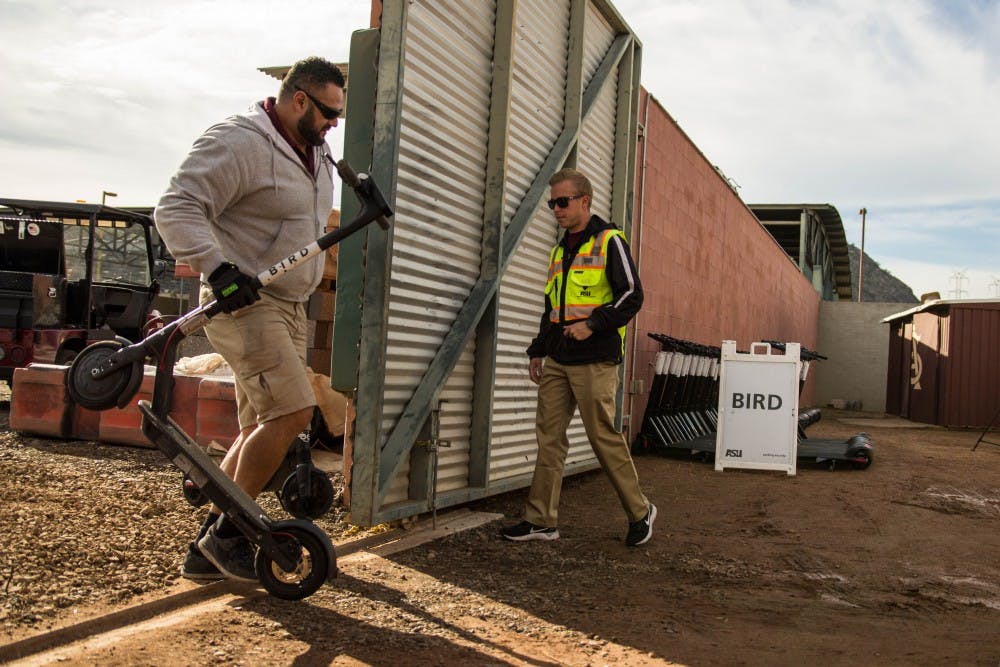Everything changed when the Birds first landed on campus.
Following the impact dockless electric scooters have had on ASU's Tempe campus and its surrounding areas, the University is continuing its work on reaching solutions with the various scooter companies.
ASU first started impounding the dockless electric scooters in November 2018 and has since taken phased approaches to address issues surrounding the scooters, including informing students about safety and scooter regulations.
An ASU spokesperson said in an emailed statement that the University is working with various dockless electric scooter companies in order to prevent the scooters from being left on campus and to keep them out of unauthorized areas.
“At this time we are primarily focused on impounding actions, on educating riders about campus scooter policy and safety and on working with the companies on technology solutions to keep the scooters from being brought onto the campus," the ASU spokesperson said.
Walk-only zone attendants are handing out fliers with information about the policies as part of a University-wide educational campaign, the ASU spokesperson said, and the University is also providing information at student orientations and campus tours.
Impounding fees for the electric scooters are the same for all other motorized vehicles and devices that are impounded on campus. No ASU students have been fined for riding the scooters on campus, but the scooter companies pay anywhere from $100 to $250 for violating ASU's policy. Currently, the scooters are allowed on the perimeters of campus and can be parked in designated areas.
The spokesperson also said that the scooter companies are currently paying for impounding actions because "it's the scooter companies that are responsible first because they let them loose on the city in the first place."
In an emailed statement, associate vice president of university business services Nichol Luoma said ASU is working with scooter companies to better display and enforce safety information regarding the scooters, adding that ASU created a website that provides a video and links to the information that students need.
The University is also working with the city of Tempe and ASU's Undergraduate Student Government to spread the word about scooter policies, she said, and all conversations between the University and the various scooter companies are all focused on safety and obeying the laws and policies that are currently in place.
Bird's app provides a tutorial that educates riders on how to properly and safely ride and park the scooters and also requires users to take a photo whenever they park the scooter at the end of their ride.
"Bird values the feedback from members of the ASU community, and we are constantly looking for ways to improve and evolve our service," a Bird spokesperson said in an emailed statement. "To help combat any issues related to the placement and parking of our vehicles on ASU’s campus, we have expanded our Bird Watchers Program."
Individuals involved in the program work with other members of their communities to ensure that the scooters are ridden and parked correctly.
"If any scooters are impounded on campus, Bird will partner with University officials to investigate each incident and take necessary action,” the company's spokesperson said.
Brandon Cheung, senior manager of government relations for Razor, said that the company has a positive relationship with ASU.
"Razor's Government Relations team has met with ASU Associate VP Nichol Luoma and her staff to discuss the challenges ASU is facing with dockless scooters and to hear their thoughts on how Razor can best tailor our operational model to address ASU's concerns," he said in an emailed statement. "Razor is focused on working with the school and complying with its rules."
Cheung said that Razor has red-zoned the ASU campus in order to discourage students from ending their rides within campus boundaries, and the company has a team that sweeps to collect any electric scooters that may have been left on campus property.
Adrian Lauderdale, a sophomore marketing major, said he hopes that the scooters will be permitted on campus and follow policies similar to those that exist for bikes.
Lauderdale said that he uses Lime scooters most frequently, and that the scooters are very practical and save time, but he has not received or seen any information on scooter policies from the University.
“It would be kind of out of the way if I’m trying to get to class and had to go around the perimeter," he said. "On campus would be great.”
The ASU spokesperson said that the University appreciates the actions of students who are using the electric scooters responsibly and safely while following the policies that are in place.
"Their effort not only helps keep our campus beautiful but more importantly it keeps the walking areas safe and accessible for the ASU community," the spokesperson said.
Reach the reporter at bstoshne@asu.edu and follow @itsbrennaaaa on Twitter.
Like The State Press on Facebook and follow @statepress on Twitter.




